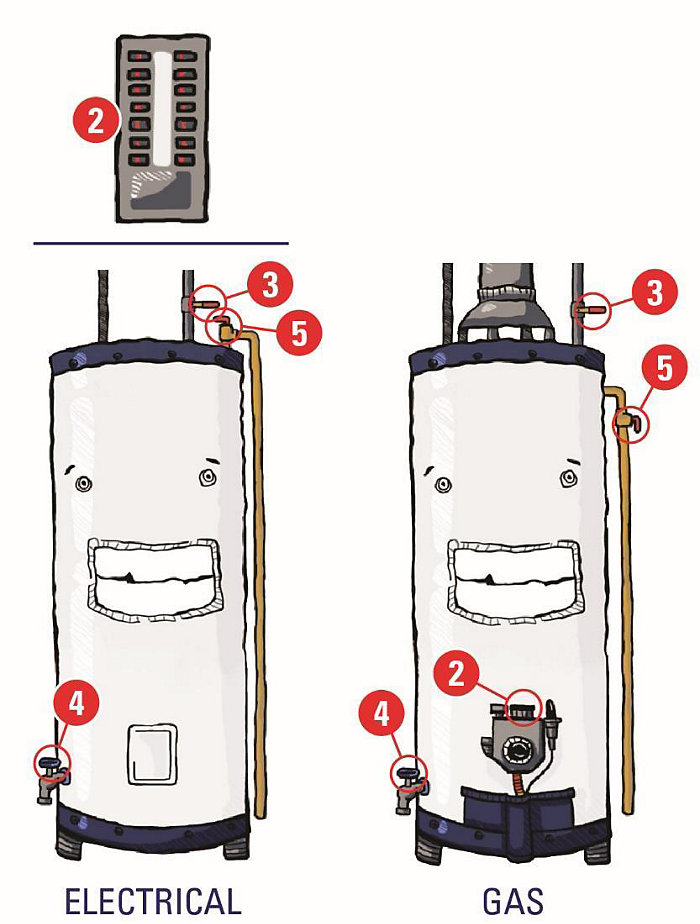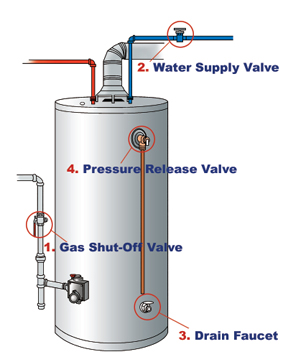If your water heater isn’t working after the water supply is turned off, check the power supply and reset the system. Ensure the water supply is restored before troubleshooting further.
A functioning water heater is essential for daily comfort, providing hot water for showers, cleaning, and cooking. When the water is turned off, the heater may stop working properly. This can be frustrating, especially if you rely on hot water for your routine.
Understanding the potential issues can save time and prevent unnecessary repairs. Common problems include a tripped breaker, sediment buildup, or a faulty thermostat. Identifying these issues early can help restore hot water quickly. Knowing how to troubleshoot the situation can make a significant difference in getting your water heater back on track.
Page Contents
- 1 Common Reasons For Post-shutdown Issues
- 2 Initial Assessment Steps
- 3 Resetting The Water Heater
- 4 Fast, Reliable Water Heater Service
- 5 Bleeding Air From The Water Lines
- 6 Dealing With Sediment Buildup
- 7 Troubleshooting Electric Water Heaters
- 8 Troubleshooting Gas Water Heaters
- 9 When To Call A Professional
- 10 Preventive Measures For Future
- 11 Diy Repair Safety Guidelines
- 12 Frequently Asked Questions
- 13 Conclusion
Common Reasons For Post-shutdown Issues
Sediment buildup can cause major issues in your water heater. This buildup happens over time. It affects the heater’s efficiency and performance. Flushing the tank can help remove this sediment.
Air in the system can also lead to problems. Air pockets may form in the pipes. This can prevent hot water from reaching your taps. Bleeding the system can help eliminate trapped air.
| Issue | Solution |
|---|---|
| Sediment Buildup | Flush the tank regularly |
| Air in System | Bleed the system |
Initial Assessment Steps
Start by checking the power supply. Ensure the water heater is plugged in properly. Look for any blown fuses or tripped breakers. Reset the circuit breaker if necessary.
Next, inspect the water valves. Make sure the cold water valve is open. Check the hot water valve as well. Closed valves can stop water flow. This may prevent the heater from working.
Resetting The Water Heater
If your water heater is not working after turning off the water, follow these steps.
Power cycling the unit can often help. Turn off the heater’s power supply.
Wait for about 10 minutes before turning it back on. This allows the system to reset.
For thermostat reset techniques, find the reset button on your heater. Press it firmly.
Check the temperature settings. Make sure they are correct for your needs.
If the heater still does not work, inspect the circuit breaker. Reset it if necessary.
Need Local Help?
Fast, Reliable Water Heater Service
Whether it’s installation, repair, or replacement, connect with a trusted local expert today. From fixing leaks and heating issues, we’ve got you covered.
Simply choose your service type in the form, share your details, and a certified water heater specialist will contact you shortly!
Smart Water Source is an informational platform that helps users connect with local plumbers. We do not directly provide plumbing services or operate as a licensed contractor.
Bleeding Air From The Water Lines
Bleeding air from water lines can resolve issues with a malfunctioning water heater. After turning off the water, trapped air may prevent proper operation. Ensuring all air is released allows the heater to function effectively again.
- To bleed air from water lines, turn off water heater first.
- Locate the bleed valve near the water heater outlet.
- Place a container under the valve to catch any water.
- Open the valve slowly to release air until water flows.
- Repeat the process for each faucet in the house.
- Precautions: Always turn off the electricity before bleeding.
- Ensure safety by using protective gear like gloves.
- Monitor the water pressure after bleeding to ensure proper flow.
Dealing With Sediment Buildup
Sediment buildup can cause your water heater to stop working. Regular maintenance helps keep it running smoothly. Flushing the water heater removes this buildup. Aim to flush it at least once a year.
To flush your water heater, follow these steps:
- Turn off the power or gas supply.
- Connect a garden hose to the drain valve.
- Open the drain valve and let the water flow out.
- Close the valve and remove the hose once it’s empty.
- Refill the tank before turning the power back on.
Preventing future accumulation is important. Regularly check and flush the system. Consider using a water softener if you have hard water. This can help reduce sediment buildup.

Credit: bakerbrothersplumbing.com
Troubleshooting Electric Water Heaters
Start by checking the heating elements. These parts heat the water. Use a multimeter to test them. A reading of infinity means they are bad. Replace any faulty heating elements.
Next, examine the electrical connections. Make sure the power is off before testing. Look for loose or damaged wires. Tighten or replace them as needed. A good connection is key to proper function.
Check the circuit breaker too. Sometimes it trips, cutting off power. Reset the breaker if necessary. Always ensure safety while working on electric appliances.
Troubleshooting Gas Water Heaters
Check the pilot light first. It should be lit for the heater to work. If it is out, follow your manual to relight it. Make sure the gas supply is turned on as well.
If the pilot light does not stay lit, there may be a problem with the thermocouple. This part senses the flame and controls gas flow. Consider replacing it if it is faulty.
Next, inspect the burner. It should be clean and free of debris. A dirty burner can cause heating issues.
Ensure the gas line is open and delivering gas properly. Listen for any hissing sounds, which may indicate a gas leak. Contact a professional if you suspect a leak.
When To Call A Professional
Several signs indicate a serious malfunction in your water heater. Look for strange noises like popping or banging. These sounds often signal sediment buildup. Leaking water around the heater is another big red flag. This can cause further damage if not fixed quickly.
Check if the water temperature is too hot or too cold. This might suggest a problem with the thermostat. Unusual smells like gas or burning can mean a dangerous issue. Don’t ignore these signs; they can lead to safety hazards.
Finding a reputable technician is important. Ask friends or family for recommendations. Online reviews can help you choose a reliable service. Always check for licenses and certifications before hiring someone.
Preventive Measures For Future
Regular maintenance is key to keeping your water heater in great shape. Check the heater every few months for signs of wear. Flush the tank to remove sediment buildup. This helps maintain efficiency and longevity.
Consider installing water softeners. They reduce mineral buildup in your system. Soft water helps prevent clogs and improves heater performance. It also extends the life of your plumbing.
Schedule professional inspections at least once a year. Experts can spot issues early. This simple step can save you from costly repairs later.
Keep the area around the heater clear. Ensure proper ventilation to avoid overheating. Following these tips will keep your water heater running smoothly.

Credit: www.reddit.com
Diy Repair Safety Guidelines
Always use the right tools for the job. This helps to avoid damage. Common tools include wrenches, screwdrivers, and pliers. Keep your work area clean and organized to prevent accidents.
Understanding your limits is crucial. If a task seems too hard, ask for help. Avoid working on your water heater if you feel unsure. Safety should always come first. Take breaks if you feel tired or frustrated.

Credit: justcallburton.com
Frequently Asked Questions
Does Shutting Off Main Water Affect Water Heater?
Shutting off the main water supply does affect your water heater. It can lead to overheating if the heater runs without water. Always turn off the heater before shutting off the main supply to prevent damage. Regular maintenance helps ensure your water heater functions properly.
How Long Can A Water Heater Go Without Water?
A water heater can typically go without water for a few hours. Extended periods without water can damage the heating elements and tank. Always ensure it’s filled before operation to avoid costly repairs. Regular maintenance helps prevent issues related to dry firing.
How Do You Reset A Hot Water Heater?
To reset a hot water heater, first turn off the power supply. Locate the reset button, usually on the thermostat. Press and hold the button for a few seconds. Turn the power back on and check if the heater operates correctly.
Always follow manufacturer guidelines for safety.
Why Is My Water Heater Running When No Water Is On?
A water heater may run without water usage due to a faulty thermostat or a leaking hot water pipe. Sediment buildup can also cause it to overheat. Regular maintenance helps prevent these issues. Check for leaks and consult a professional if the problem persists.
Conclusion
Experiencing issues with your water heater after a water shut-off can be frustrating. Remember to check your power source and reset the unit. If problems persist, consider consulting a professional. Regular maintenance can prevent these issues in the future. Stay proactive to ensure your hot water supply remains uninterrupted.
